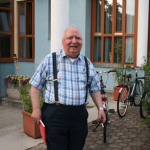Reconciliation in Bosnia
INSPIRATIONAL, 20 Jun 2016
Prof. Dietrich Fischer – TRANSCEND Media Service
 In 2000, Dr. Hossain B. Danesh, the President of Landegg International University in Wienacht, Switzerland [and member of the TRANSCEND Network for Peace, Development and Environment], was invited by all three nationalities in Bosnia and Herzegovina (Bosniaks, Croats and Serbs) to introduce education for peace, based on the principles of the oneness of humanity and unity in diversity. He started with a pilot project, teaching the basics to teachers and journalists in three cities: Sarajevo, Banja Luca and Travnik.
In 2000, Dr. Hossain B. Danesh, the President of Landegg International University in Wienacht, Switzerland [and member of the TRANSCEND Network for Peace, Development and Environment], was invited by all three nationalities in Bosnia and Herzegovina (Bosniaks, Croats and Serbs) to introduce education for peace, based on the principles of the oneness of humanity and unity in diversity. He started with a pilot project, teaching the basics to teachers and journalists in three cities: Sarajevo, Banja Luca and Travnik.
In Travnik, there were two communities (Bosniaks and Croats). For one and a half year of weekly lectures, they did not mingle at all. All the Croats, who are Catholics, sat on the left side of the room, along with a nun, separated by a walkway from all the Bosniaks, who are Muslims, who sat on the right side, along with an Imam. During breaks, they went to separate rooms to drink tea.
One day, a Croatian mother of three children, whose husband had died in the war, died of an illness. The Croatian community attended the funeral, and announced they would be late. That day, Dr. Danesh changed his lecture, and spoke for two hours about untimely death and how people mourn the loss of loved ones in various religions and cultures.
Suddenly, one of the Muslim men turned towards the Croats and said, “I have never had the courage to tell this before, but when my sister was caught behind enemy lines during the civil war (among the Croats in Bosnia) and became seriously ill, some members of your community drove her eight hours to a hospital in Zagreb and saved her life. I wish to thank you for this.” He had tears in his eyes, and everyone was deeply moved.
Some Croats told stories of how their relatives found refuge with Muslim families who were hiding them in their basements to protect them and fed them during the war, risking their own safety. This prompted other Muslims to tell about good deeds and help that they had received from Croats, and so on. During the break, they mingled for the first time and members of the two communities became very warm towards each other. After the break, they did no longer sit separately, but mixed. This was a breakthrough, which contributed to healing and reconciliation.
For Bishop Tutu in South Africa, who had grown up with the Anglican and Catholic practice of confessing sins and then have them forgiven, found it natural to apply that process in the Truth and Reconciliation Commission. However, in some cultures people find it very difficult and a great loss of face to admit mistakes. It is easier to say kind things about former adversaries. In such cases, an alternative process of reconciliation is required. Based on this and many other relevant examples, Dr. Danesh has developed a new approach to healing the wounds of large-scale violent conflict. The approach is called, “Creating a Culture of Healing.”
_____________________________________
Dietrich Fischer (1941-2015) from Münsingen, Switzerland, got a Licentiate in Mathematics from the University of Bern 1968 and his Ph.D. in Computer Science from New York University 1976. 1986-88 he was a MacArthur Fellow in International Peace and Security at Princeton University. He has taught mathematics, computer science, economics and peace studies at various universities and been a consultant to the United Nations. He was co-founder, with Johan Galtung, of the TRANSCEND Network for Peace, Development and Environment in 1993.
Excerpted from Dietrich Fischer’s Stories to Inspire You – TRANSCEND University Press-TUP.
This article originally appeared on Transcend Media Service (TMS) on 20 Jun 2016.
Anticopyright: Editorials and articles originated on TMS may be freely reprinted, disseminated, translated and used as background material, provided an acknowledgement and link to the source, TMS: Reconciliation in Bosnia, is included. Thank you.
If you enjoyed this article, please donate to TMS to join the growing list of TMS Supporters.

This work is licensed under a CC BY-NC 4.0 License.